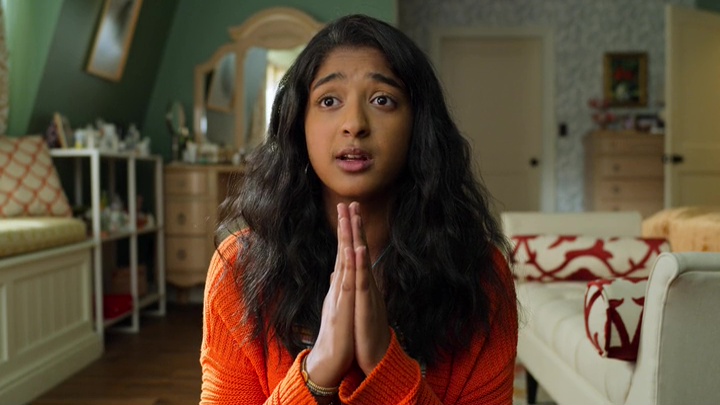Never Have I Ever was always my least favorite game.
I never wanted to participate in an activity that only emphasized how much I hadn’t done, how different my identity and experiences were from my high school peers.
However, after watching Mindy Kaling’s TV show Never Have I Ever, I can’t help but love the game a little bit more.
I watched Never Have I Ever with my two sisters over Netflix Party. My oldest sister is on the frontlines in Manhattan helping COVID-19 patients, so clearly, the break was needed. As we are all Indian-American women, finally having a show with our identity expressed in a main character was a Godsend.
On its surface, Never Have I Ever is about Devi Vishwakumar (Maitreyi Ramakrishnan), a high school sophomore who has just lost her father but is more focused on attempting to raise her popularity and find a boyfriend. However, the stories and lessons of the show are profound—there is a robotics genius grappling with her identity as a gay woman, a nemesis struggling with loneliness and a difficult parent situation, and a drama student attempting to follow her dreams even as her mother left her behind. The show has racial and ability diversity without tokenization, and shows a family of three compelling women that offers a Jane the Virgin-esque aura of female solidarity. Most importantly, it offers deep lessons on the complexity of grief and the importance of family–the scene where Devi’s mother rides her husband’s motorcycle is bound to make you cry.
In other words, Never Have I Ever was right up my alley. The show’s intellectual and emotional depth never stopped it from being fun and light-hearted, making it the perfect salve for anxious pandemic times. I’m a romantic, and the romance was highly entertaining, invoking a To All the Boys I’ve Loved Before (2018) vibe that might just make you smile. Some of the humor is an acquired taste, but laugher is the best medicine—and the show even provides an Andy Samberg cameo for all the Brooklyn Nine-Nine lovers out there.
However, anyone watching the show cannot help but feel a crushing second-hand embarrassment in nearly every episode. From asking her crush to have sex with her to attempting to talk to a coyote, Devi is sometimes a difficult character to love.
Yet Devi’s flaws are an honest representation of her youth, and of the grief and anger she must experience in the aftermath of tragedy. She makes mistakes and grapples with her Indian identity. She can be selfish, and she can care too much about her relationship status, but it’s because of these imperfections that she and the show feel authentic, a feeling so many immigrant children struggle with.
That immigrant perspective is one of the components I valued most in the show. Kaling beautifully demonstrates the difficulties of feeling not Indian enough for Indians but looking too Indian for Americans. She shows what the tensions of arranged marriages are like as Devi’s beautiful cousin decides whether to follow the duties of her family or be with the man that she loves. She illustrates the experience of immigrant extended families, the way that Devi’s mom feels like she has no support system and how she takes that out on her child. Kaling shows how one person’s culture and religion shape how they view the world, but how those differences do not make her any less American.
The other invaluable aspect to the show is its honest analysis of processing loss. At its core, Never Have I Ever is a show about grief. Those watching the first episode may be taken aback by the light-hearted tone and the very high-school nature of Devi’s priorities. As someone who has recently had to experience grief, and as many around the world are forced to lose loved ones, this initial tone can be off-putting. However, by the end of the show, Devi’s coming-to-terms with her loss is moving and realistic, and makes you adore her father so much you wish you could have known him.
Never Have I Ever isn’t perfect. The bizarre tone and narration, as well as some plot points (for instance, a permit-holder driving by himself on the highway), can be quite ridiculous. The show could also do more to engage with some of the Islamophobia within the Hindu community. But many of the problems I have with the show are that it’s just too high school when, really, that’s all it’s trying to be.
The characters care about TikTok likes (and have started a new dance challenge), watch Riverdale, participate in Model UN to boost their extracurriculars, aim for Ivies, idolize high school parties, and do everything many college students have just simply moved on from. At the same time, Never Have I Ever makes me think about the high school experience I could have had, the moments I missed out on. Of course, this mindset is indicative of how our society idealizes high school while simultaneously creating unrealistic standards for high schoolers by having 30-year olds play them (even though Paxton is REALLY hot).
This idealization is unhealthy, for sure. Some of the unrealistic standards are assuaged by the fact that the actress who plays Devi is much closer to high school age and rose to prominence by auditioning for the part after Kaling posted on social media. Yet for the pleasant pandemic TV break (each episode only 30 minutes long), and for the ways that the show can give young people a healthier, more diverse view of society than shows that came before, I think Never Have I Ever did exactly what it was supposed to do. It was the type of show that I wish I had gotten to grow up with, but even though I can’t give high school Natalie that gift, I can give it to myself now. And perhaps its lessons on grief are precisely why now is the time to watch it.
Maybe I’ll never lose a game of Never Have I Ever because of all my radical experiences. We will never get high school back, nor should we particularly want to. But at the very least, if anyone ever says, “Never have I ever…watched a TV show where the main character is my identity,” I can finally put one finger down.






